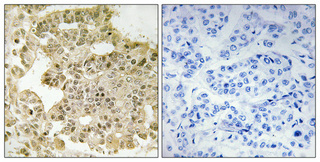eIF5B Polyclonal Antibody
- SPECIFICATION
- CITATIONS
- PROTOCOLS
- BACKGROUND

Application
| WB, IHC-P |
|---|---|
| Primary Accession | O60841 |
| Reactivity | Human, Mouse, Rat |
| Host | Rabbit |
| Clonality | Polyclonal |
| Calculated MW | 138827 Da |
| Gene ID | 9669 |
|---|---|
| Other Names | EIF5B; IF2; KIAA0741; Eukaryotic translation initiation factor 5B; eIF-5B; Translation initiation factor IF-2 |
| Dilution | WB~~Western Blot: 1/500 - 1/2000. Immunohistochemistry: 1/100 - 1/300. ELISA: 1/40000. Not yet tested in other applications. |
| Format | Liquid in PBS containing 50% glycerol, 0.5% BSA and 0.09% (W/V) sodium azide. |
| Storage Conditions | -20℃ |
| Name | EIF5B |
|---|---|
| Synonyms | IF2, KIAA0741 |
| Function | Plays a role in translation initiation (PubMed:10659855, PubMed:35732735). Ribosome-dependent GTPase that promotes the joining of the 60S ribosomal subunit to the pre-initiation complex to form the 80S initiation complex with the initiator methionine-tRNA in the P-site base paired to the start codon (PubMed:10659855, PubMed:35732735). Together with eIF1A (EIF1AX), actively orients the initiator methionine-tRNA in a conformation that allows 60S ribosomal subunit joining to form the 80S initiation complex (PubMed:12569173, PubMed:35732735). Is released after formation of the 80S initiation complex (PubMed:35732735). Its GTPase activity is not essential for ribosomal subunits joining, but GTP hydrolysis is needed for eIF1A (EIF1AX) ejection quickly followed by EIF5B release to form elongation- competent ribosomes (PubMed:10659855, PubMed:35732735). In contrast to its procaryotic homolog, does not promote recruitment of Met-rRNA to the small ribosomal subunit (PubMed:10659855). |
| Cellular Location | Cytoplasm {ECO:0000250|UniProtKB:Q05D44}. |

Thousands of laboratories across the world have published research that depended on the performance of antibodies from Abcepta to advance their research. Check out links to articles that cite our products in major peer-reviewed journals, organized by research category.
info@abcepta.com, and receive a free "I Love Antibodies" mug.
Provided below are standard protocols that you may find useful for product applications.
Background
Plays a role in translation initiation. Translational GTPase that catalyzes the joining of the 40S and 60S subunits to form the 80S initiation complex with the initiator methionine-tRNA in the P-site base paired to the start codon. GTP binding and hydrolysis induces conformational changes in the enzyme that renders it active for productive interactions with the ribosome. The release of the enzyme after formation of the initiation complex is a prerequisite to form elongation-competent ribosomes.
If you have used an Abcepta product and would like to share how it has performed, please click on the "Submit Review" button and provide the requested information. Our staff will examine and post your review and contact you if needed.
If you have any additional inquiries please email technical services at tech@abcepta.com.













 Foundational characteristics of cancer include proliferation, angiogenesis, migration, evasion of apoptosis, and cellular immortality. Find key markers for these cellular processes and antibodies to detect them.
Foundational characteristics of cancer include proliferation, angiogenesis, migration, evasion of apoptosis, and cellular immortality. Find key markers for these cellular processes and antibodies to detect them. The SUMOplot™ Analysis Program predicts and scores sumoylation sites in your protein. SUMOylation is a post-translational modification involved in various cellular processes, such as nuclear-cytosolic transport, transcriptional regulation, apoptosis, protein stability, response to stress, and progression through the cell cycle.
The SUMOplot™ Analysis Program predicts and scores sumoylation sites in your protein. SUMOylation is a post-translational modification involved in various cellular processes, such as nuclear-cytosolic transport, transcriptional regulation, apoptosis, protein stability, response to stress, and progression through the cell cycle. The Autophagy Receptor Motif Plotter predicts and scores autophagy receptor binding sites in your protein. Identifying proteins connected to this pathway is critical to understanding the role of autophagy in physiological as well as pathological processes such as development, differentiation, neurodegenerative diseases, stress, infection, and cancer.
The Autophagy Receptor Motif Plotter predicts and scores autophagy receptor binding sites in your protein. Identifying proteins connected to this pathway is critical to understanding the role of autophagy in physiological as well as pathological processes such as development, differentiation, neurodegenerative diseases, stress, infection, and cancer.


